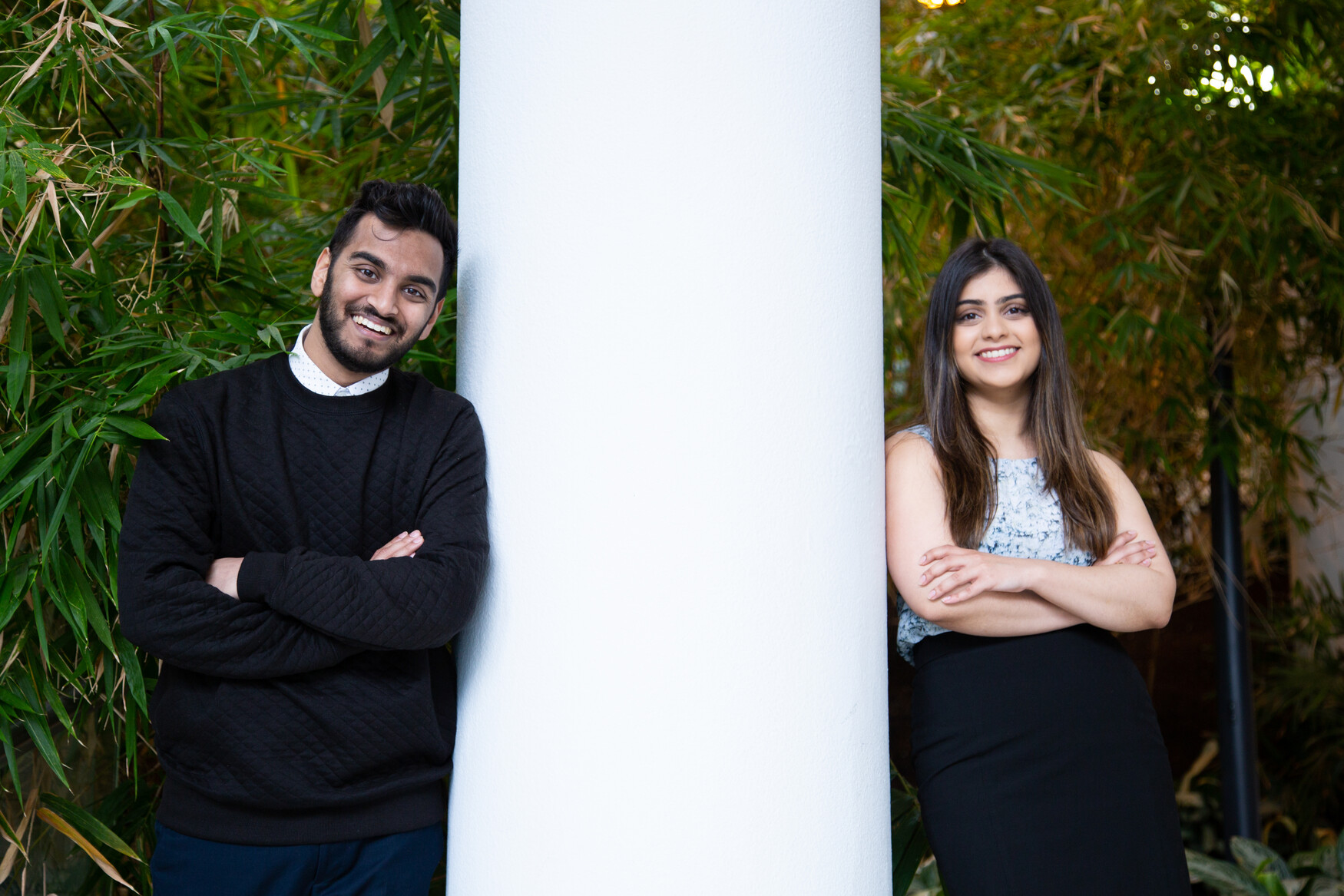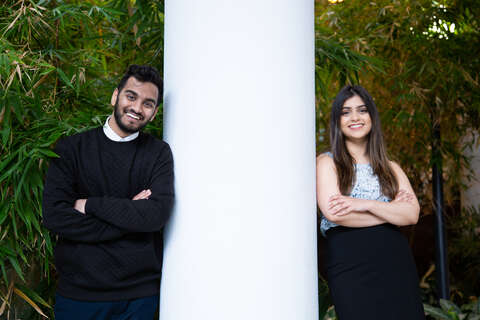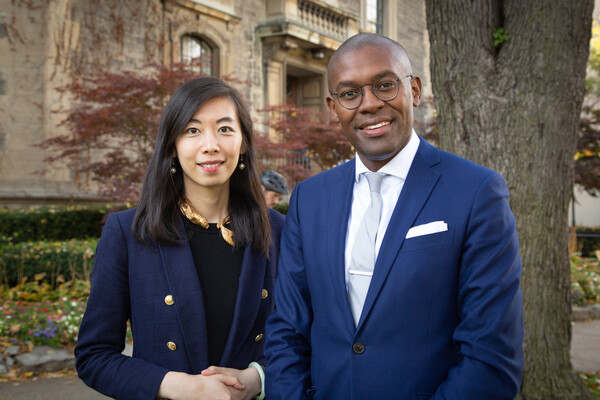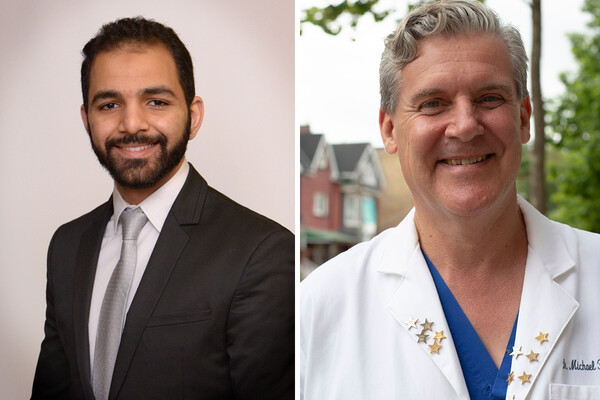Breadcrumbs
- Home
- MD/PhD Program
- News
- Faces of U of T Medicine: Neha Puri & Rohit Vijh
Faces of U of T Medicine: Neha Puri & Rohit Vijh

Julia Soudat

Neha Puri and Rohit Vijh are fourth-year students in the MD Class of 1T9. They're also cousins, friends and each other's biggest supporters. As they prepare to graduate and start their residencies, they share what inspired them to become doctors and the most important lessons they've learned in medical school.
What made you want to pursue a career in medicine?
Neha: In high school, I wanted to be a pharmacist as I was working in a pharmacy and my sister was pursuing a career in the field. But during undergrad, I began to explore medicine as a career and quickly realized that it would be a better fit for my personality and aspirations.
Rohit: During my undergrad at McGill, I worked in clinical epidemiology research around bridging the gap between mobile/electronic health services and HIV care. I also had a variety of counseling and leadership positions working with vulnerable populations. Towards the end of my undergrad, I realized that physicians are often at the heart of both providing compassionate care to patients individually and implementing change at a systemic level. This really motivated me to pursue a career in medicine.
Was medical school what you thought it would be before you started?
Neha: I always imagined we would be thrown into a clinical setting and suddenly everything would come together. However, medical school was really a continuum where every year, we built upon the skills we previously learned. Our first year focused primarily on human anatomy and physiology while learning the fundamentals of a good history and physical examination. In our second year, we continued to develop these skills while learning a significant amount of medical content. During our clerkship year, we learned how to integrate our vast medical knowledge with the art of clinical medicine. In our graduating year, we continued to fine-tune these skills while reflecting on the kind of physician we aspire to be.
Rohit: Medical school was not what I imagined it to be. You hear stories about the rigorous and competitive nature of medical school, and it was definitely rigorous but I also met some of the most amazing friends and colleagues. As early as orientation week, I met some of my closest friends who supported me through the toughest moments in medical school. I also never expected to meet so many amazing physician mentors through my pre-clerkship and clerkship years. I was afraid that I would not “find my people” but U of T has such a large community that it’s almost impossible not to.
What were the most important lessons you learned in medical school?
Neha: The value of maintaining friendships with those outside of medicine in addition to those in medicine. While my friends in medicine were my go-to people to discuss difficult patient cases and exam stress, my non-medicine friends kept me grounded and cheered me on during the tough moments.
Rohit: Being kind and compassionate to yourself. Medical education is a strenuous process that takes a huge psychological and emotional toll. The long hours of working and studying can engulf you and it becomes easy to neglect your own well-being. Being able to carve out time or saying no to opportunities in order to heal and foster your own resilience is extremely important. You are not going to be good to anyone if you are not good to yourself.
What were some of the advantages of being in the same class as a family member?
Neha: It was amazing to have someone in the class to indefinitely rely on. Throughout the highs and lows of medical school and life, Rohit and I have laughed, cried and celebrated together. Although we’re pursuing different specialities in different provinces, I am confident that we will still be there for one another - and for that, I am grateful.
Rohit: Having Neha was always a comforting presence. I will always cherish the time when my grandfather passed away while we were on a medical student retreat in Kingston. My family had been trying to get in touch with me but my phone had been turned off. Neha called my hotel room and broke the news outside in the hallway at 6 AM. We packed up all my stuff and she dropped me off the train station in Kingston to head back to Toronto. I look at that incredibly difficult time and think how lucky I was to have a family member there with me. Having this kind of unconditional support is rare, especially in medical school.
These four years have changed our dynamic in so many ways. Being able to relate through the personal and professional hurdles has given a unique way to relate to one another—that neither our friends or family can simply relate. We made a point to always check in with each other and when things were not going well—we were there no matter what. No questions asked. It'll be difficult not having Neha around, but no distance will stop us from venting, laughing or crying with one another.
What’s coming up next?
Neha: I will be starting my internal medicine residency at the University of Toronto.
Rohit: I will be starting my residency in Public Health and Preventative Medicine in Vancouver at UBC. I will be doing a Master’s of Public Health, followed my family medicine training and then public health training.
What advice would you give to incoming students?
Neha: Medical school is just the beginning of our career as lifelong learners. We learn a lot in medical school and sometimes the volume can be overwhelming. However, no one expects you to know everything – we honestly have our whole career ahead of us to continue to learn! As a medical student, be curious and enjoy the process.
Rohit: Self-reflection and being honest with yourself is key. You know how to study and learn for exams. You know how to excel in research projects or community based projects. But understanding your emotions and feelings as you progress through various stages of your medical training is not as easy as it sounds. Being able to take time every so often to check in with how your anxiety or mood is doing is so critical. And if there is an imbalance to make it a priority to get help- whether that be seeing a professional or reaching out to your personal network. Do not be afraid to confide in your friends that you are struggling, chances are they are too. Some of the best revelations and breakthroughs I have had in difficult periods of my life have come from conversations where everyone is being honest with where they are at. There are going to be amazing highs but also lows, and making sure you checking in at all times is extremely critical.
But also have fun and enjoy and savour every possible moment you have in these 4 years, they truly do fly by so quickly!
News


